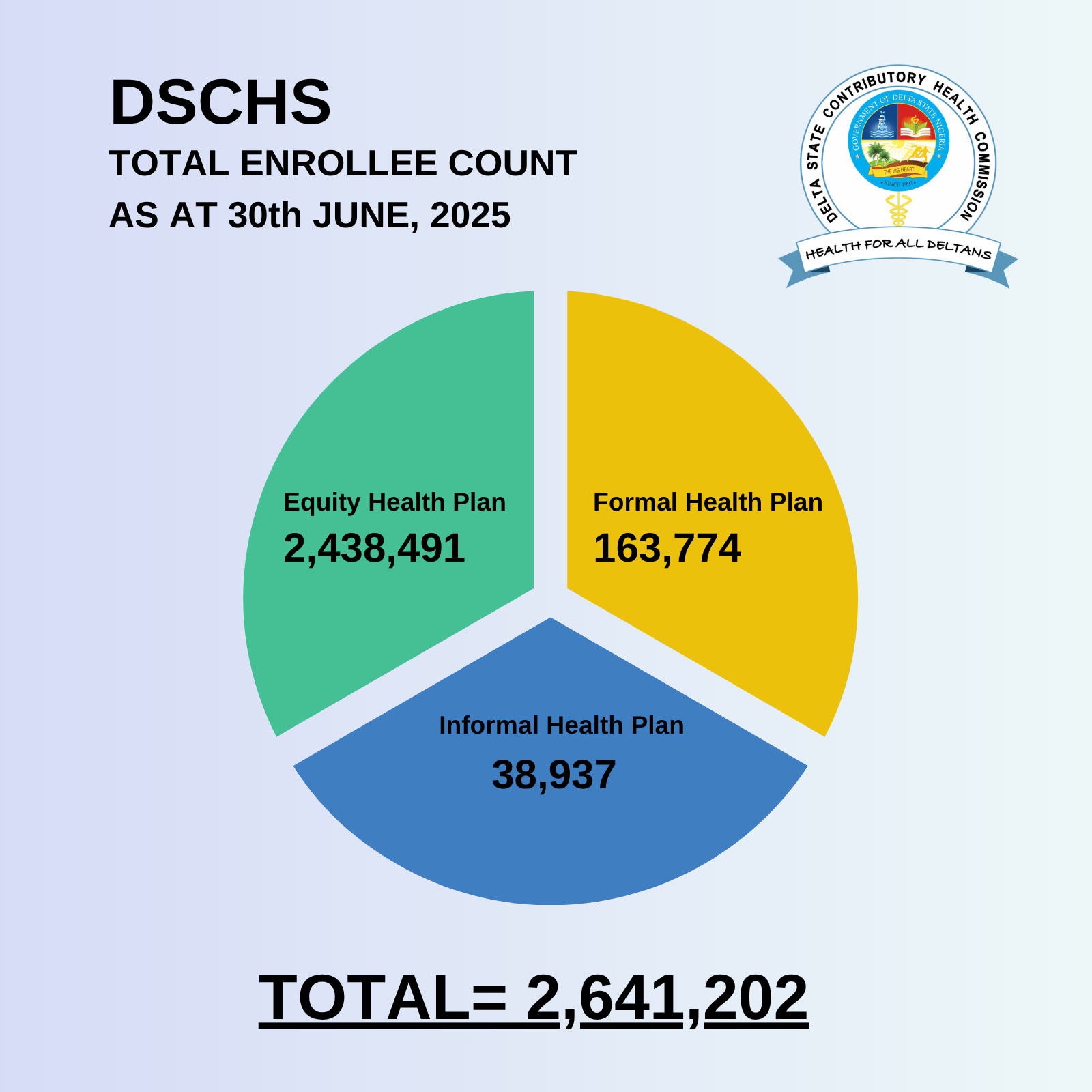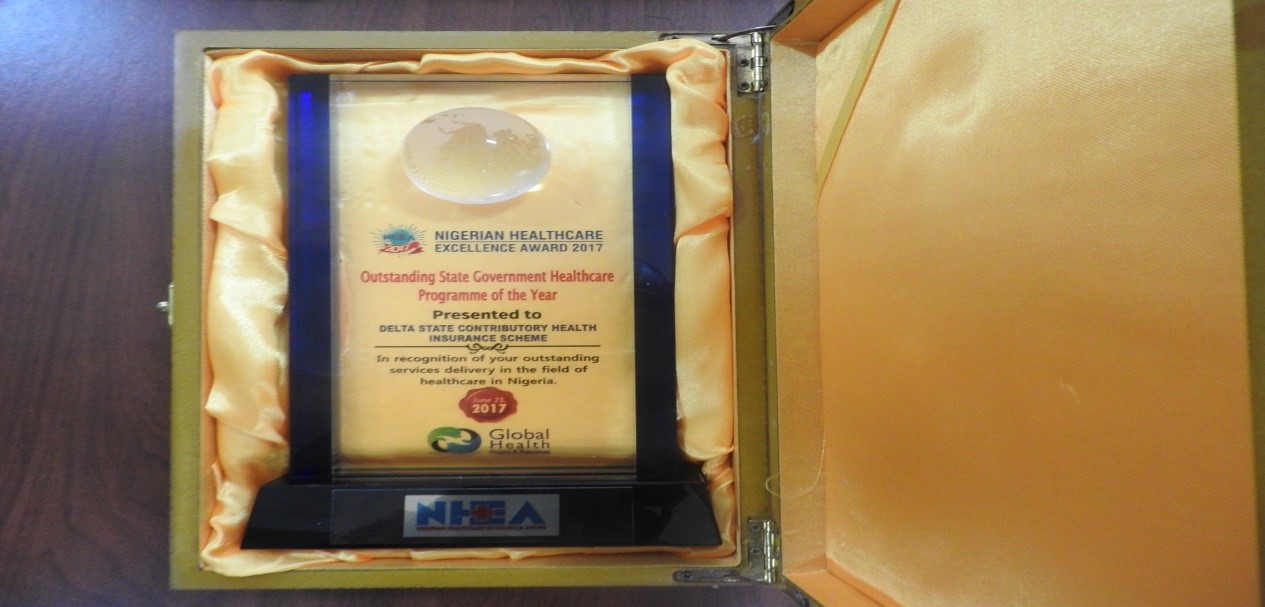Delta State Contributory Health Commission
The Delta State Contributory Health Commission is a Healthcare Financing organization established by the Delta State Government to ensure access to quality healthcare services for all residents of Delta State irrespective of their socio-economic status and geographical location, in an effort to achieve the United Nations' Sustainable Development Goal 3 in the year 2030.
The United Nations' Sustainable Development Goal 3 [Ensure Healthy Lives and Promote Well-being for all at all Ages] has the attainment of Universal Health Coverage (UHC) as one of its key deliverables.
According to the World Health Organization, Universal Health Coverage (UHC) means that every person and community can have access to the promotive, preventive, curative, rehabilitative and palliative health services they need, of sufficient quality to be effective, while also ensuring that the use of these services does not expose the user to financial hardship.
During the United Nations Sustainable Development Summit in 2015, world leaders agreed to achieve UHC by 2030. UHC is also firmly envisaged in the WHO constitution of 1948 declaring health a fundamental human right and on the “Health for All” agenda set by the Alma Ata declaration in 1978.
Universal Health Coverage has three fundamental component objectives, namely:
- Equity in Access to Health Services where everyone who needs healthcare should get them, not only those who can pay for them.
- The quality of health services should be good enough to improve the health of those receiving services.
- People should be protected against financial-risk, ensuring that the cost of using the healthcare services does not put people at risk of financial harm.
In Nigeria, the National Health Insurance Scheme (NHIS) was established as the vehicle to achieve Universal Health Coverage in the country. The Scheme was signed into law in 1999 and officially launched on 6th June, 2005. It commenced service delivery to enrollees in September, 2005, and currently has about 5% of Nigerians covered under the Scheme in 15 years.
In Delta State, the journey towards achieving Universal Health Coverage (UHC) commenced with the transmission of an Executive Bill to the Delta State House of Assembly on the 22nd of June, 2015, to establish the Delta State Contributory Health Commission. The Bill went through a first reading on the 24th of June, 2015, second reading on the 12th August, 2015, and a public hearing on the 26th August, 2015. The Bill had its third reading and was passed by the Delta State House of Assembly on the 9th December, 2015. The Bill establishing the Delta State Contributory Health Commission was signed into Law by His Excellency Senator Dr Ifeanyi Okowa, Governor of Delta State, on the 4th of February, 2016.


![]()
The Law established The Delta State Contributory Health Commission (DSCHC), The Delta State Contributory Health Scheme (DSCHS) and other Matters Connected Thereto, as well as, a Governing Board for the DSCHC which will regulate, supervise, implement and ensure an effective administration of a “Mandatory” Delta State Contributory Health Scheme for all residents of Delta State.
The DSCHS has 4 Enrollee Health Plans: -
- Formal Health Plan for those whose premium are paid via Payroll % deductions covering a Husband, Wife and 4 Children below 18 years with a counterpart employer contribution for each Principal Enrollee.
- Informal Health Plan for those whose premium of N7,000/year/Enrollee are paid per individual enrollee covering only the individual enrollee.
- Equity Health Plan for those who have been classified as belonging to the Vulnerable Group (Pregnant Women, Children Under 5 Years, Elderly above 65 Years, Physically and Mentally Challenged and all residents of Delta State classified as Poor). Their Premium of N7,000/year/Enrollee is paid for by the Delta State Government.
- Private Health Plan for individuals that subscribe to pay extra premium for extra Healthcare service needs under the DSCHS.
Before commencement of service delivery, the DSCHC conducted a Baseline Assessment Survey that: -
- Determined key household demography and health seeking behavior of Deltans to guide planning for an expanded health insurance coverage.
- Determined the current household spending on health, health insurance coverage needs and willingness to pay for health insurance in Delta State.
- Estimated the proportion of Delta State residents in the lowest socio-economic quintiles, to guide decisions on subsidy and/or exemptions from payment.
- Assessed the availability and capacity of health delivery facilities in Delta State to deliver proposed health insurance services.
- Assessed the readiness of health facilities to deliver proposed services across all 25 LGAs.
The Baseline Assessment Survey Report is available at the Download Section of the DSCHC Website www.dschc.org.ng. A Post 4 years Progress Assessment Survey is currently ongoing and its report will also be on the website.
The DSCHC commenced service under the scheme on the 1st of January, 2017, and currently has provided service to 1,995,816 Enrollees in 7 years.

The DSCHC currently has 510 Accredited Public and Private HCFs for Primary healthcare and Secondary healthcare services spread across the State. The quality-of-service monitoring and accreditation of HCF is a continuous DSCHC service activity to ensure regular quality care for all enrollees of the Scheme.
To ensure availability of quality services and affordable quality drugs especially for Non-Communicable Diseases which usually have a huge 'drugs and other services' management cost, the DSCHC representing the Delta State Government signed an MOU with Servier Pharmaceutical of France for its “Hospital Cash Cover Program” that will provide subsidized Antihypertensive and Diabetics Drugs; Train 200 health service delivery personnel in Delta State on the latest treatment protocol in management of Hypertension and Diabetes; Support the Delta State Government through support payment of Premium for an agreed number of Vulnerable people under the Scheme, and eventually produce Generic Drugs for use under the Scheme from Servier/SWIPHA manufacturing facility in Nigeria.
In an effort to further improve on the management of Non-Communicable Diseases, the Delta State Contributory Health Commission representing the Delta State Government is also partnering with SANOFI, a French Drug manufacturing company, to:
i. Build capacity for 400 HCPs (Doctors, Nurses, Pharmacists and CHEWS) to increase the number and quality of Health Care Providers (HCPs) in rural PHCs,
ii. Upgrade of Rural PHCs, to strengthen the management of diabetes and hypertension by implementing Diabetes and Hypertension Clinics through provision of medical utility equipment, educational materials and upskilling the HCPs to increase the utilization of the PHCs by patients in underserved communities. (The “A2F” Polobubo, Oporoza, Ovwor-Olomu and Obior HCFs were selected as the initial Rural HCFs for the Diabetic Hypertensive Clinics),
iii. Enroll 2000 Patients into the DSCHS through Support Payment of their Premium by SANOFI and screening of 10,000 residents to identify undiagnosed people living with diabetes and hypertension in rural communities,
iv. Provide 50% discount price off Insulin market price by Sanofi to the Delta State Drug Revolving Fund,
v. Provide affordable care support (with up to 40% discount price for other SANOFI’s primary and secondary care medicines) through the Delta State Drug Revolving Fund, and
vi. Engage a Patient Support Program for 2000 PLWD on Sanofi Insulin, through the provision of diagnostic tools (e.g glucometers), dedicated patient educators, 12hrs call center for patients, HBA1c check, educational materials, and 12 months follow up for each of the 2000 PLWD to improve patient adherence to treatment.
The DSCHC has commenced the implementation of the BHCPF program in Delta State. The program implementation involves NIMC National Identity Number (NIN) standard Enrollee Registration, Service delivery to Enrollees at NHIS/DSCHC accredited HCFs, Payment for service delivery to accredited Healthcare Providers from a dedicated CBN TSA account, Monitoring and Evaluation of the various service delivery components by a NHIS/DSCHC Team, and Analytics and Reporting for the service delivery outcomes. The DSCHC has commenced the NIMC (NIN) standard Enrollee registration activity, and following the signed agreement between the DSCHC and NIMC, the DSCHC is the only State Health Insurance Agency in Nigeria approved to register and directly obtain NIMC (NIN) through an “API” and the only Health Insurance Agency in Nigeria listed by the National Information Technology Development Agency (NITDA) as compliant with the National Data Protection Regulation (NDPR) requirement for National Data storage and management. Service delivery to Enrollees has commenced at the NHIS/DSCHC accredited HCFs through the incorporation of the BHCPF program into the DSCHC Equity Health Plan.
The Delta State Contributory Health Scheme has so far won 2 National Awards and several accolades since inception in 2016. In 2017, the Scheme won the Outstanding Healthcare Program of the Year, presented at the Nigerian Healthcare Excellence Award ceremony in recognition of the States outstanding service delivery in the field of healthcare and the State Supported Health Insurance Scheme program in Nigeria. In 2018, the Scheme won an award as the State with the most people covered under the State Social Health Insurance Scheme with focus on the Poor and Vulnerable population in Nigeria under the World Bank/FG – Save One Million Lives Program. The Award was presented by His Excellency, the Vice President of Nigeria, Professor Yemi Osibanjo. The DSCHC targets to achieve a 25% of Delta State population Enrollee coverage by the Year 2023.

The Delta State Contributory Health Commission is currently progressing and supporting other States in Nigeria through best practice knowledge experience sharing and capacity enhancement. Several States have so far been sponsored by UNICEF and WHO for a study tour to Delta State to enhance the setting up and up-scaling of their Health Insurance programs to ensure that Nigeria as a country is able to achieve the Universal Health Coverage mandate of “Health for All” in year 2030.
OBJECTIVES OF DELTA STATE CONTRIBUTORY HEALTH COMMISSION
100 Access to healthcare services
99 Equitable healthcare services
100Financial and social protection
100 Health for all deltans
- Implement, supervise and regulate the effective administration of the Delta State Contributory Health Scheme.
- Ensure that every resident of Delta State has access to equitable health care services.
- Ensure that all residents of Delta State have financial protection, and physical access to quality and affordable health care services.
- Protect families from the financial hardship of huge medical bills.
- Limit the rise in the cost of healthcare services.
- Ensure equitable distribution of health care costs across different income groups.
- Maintain high standard of health care delivery services within the Health Scheme.
- Ensure efficiency in health care service delivery.
- Improve and harness private sector participation in the provision of health care services.
- Ensure adequate distribution of health facilities within the State.
- Ensure appropriate patronage at all levels of the health care delivery system.
- Ensure the availability of alternative sources of funding to the health sector for improved services.
- In cases where residents do not have available medical and other health services, to take such measures as are necessary to plan, organize, and develop medical and other health services commensurate with the needs of the residents.
- Any other necessary action to facilitate access to Health care services for all Deltans.
DSCHC Vision
A contributory Health scheme that is, dynamic, effective and efficient with capacity to enhance and ensure a vibrant and sustainable health financing security for all residents of Delta State irrespective of their socio-economic status.
DSCHC Mission
The DSCHC Mission is to ensure access to quality healthcare and financial protection for all residents of Delta State using a healthcare financing mechanism structured through a mandatory pooling of cost and risk with fair utilization of all available resources and private sector participation that leads to an equitable distribution of healthcare across the State for an efficient healthcare service delivery.



